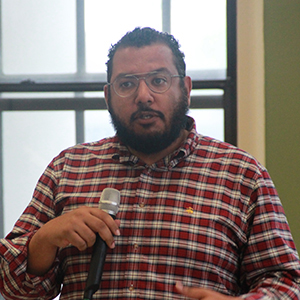American churches are ideally positioned to help replace a broken criminal justice system with one that empowers communities to heal the trauma that fosters violent crime, according to panelists on a Jan. 17 webinar.
The online conversation hosted by Equal Justice USA focused on creating “community-centered public safety ecosystems” — local movements designed to heal and prevent the fear and violence that fuel the trauma behind most violent crimes.

Mona Cadena
“Ecosystems start at the block level, and churches are on our blocks — all around our blocks,” said Mona Cadena, director of advocacy and campaigns EJUSA. “And as parts of communities, churches are a central place to start to learn and understand what folks in those neighborhoods need the most.”
Churches “have a front row seat to the violence that’s happening in their communities and are able to sit in that place and support the healing, whether it’s of parishioners or in the community,” she added. “It’s a really powerful way to support an ecosystem becoming vibrant. Everybody deserves a chance to heal, and churches see people who suffer from violence regularly.”
Creating safety ecosystems generally includes restorative justice, violence intervention, drug courts, supportive housing and other programs funded by government but usually administered from the ground up, said Sam Heath, manager of EJUSA’s Evangelical Network.
“There are communities that have already begun to invest into new system approaches,” he said, noting that Newark, N.J., is considered a leader in the movement.

Sam Heath
Regardless of how safety ecosystems evolve in a given context, they are sorely needed as an alternative to a broken criminal justice system grounded in white supremacy and retribution, he said. “We know the old ways are not working. We know that policing and prisons are not giving us this idea of safety.”
The U.S. criminal justice system is a continuation of historic oppression, Cadena said. “Mass incarceration is fully connected to the institution of slavery in this country. The system is working exactly how it’s supposed to work, which is to keep that control and to ensure that as many (Black and brown) folks are housed in prisons as possible.”
Heath said most people struggle to conceive of public safety without the death penalty and heavily funded police and jails. “It’s a big turn for people to think of the (criminal justice) system itself as an agent of violence, which it is. And it’s critical that we think that.”
The current punitive system of criminal justice has been ineffective since introduced to the U.S. by Christians in the 1700s as a way to produce repentance through incarceration. “We know that kind of forced isolation doesn’t bring about repentance but adds further trauma and continues that cycle of violence,” Heath said.
Christians must look to Scripture and Jesus for the inspiration to oppose that ineffective and oppressive system, he asserted. “What does it look like to break that cycle of violence? I think about Jesus saying, ‘Turn the other cheek.’ Sometimes that’s misinterpreted as complete non-engagement and pacificism, but what that’s getting at is choosing to end the cycle of violence. It doesn’t mean to not act. In the Psalms it talks about breaking the arm of the wicked. Christians are meant to engage and act justly and love mercy.”
“Any time you have a prison mentioned in Scripture, it’s always negative.”
Besides, prisons are never described positively in the Bible, Heath said. “Any time you have a prison mentioned in Scripture, it’s always negative. It’s always someone wanting to be released from that.”
Jesus sought their release, too, including when he said his mission included setting the prisoners free.
“There’s a spiritual element of that, but I also believe that is a literal release of those who are imprisoned,” Heath said. “Maybe it’s not automatic. Maybe it’s not without certain conditions. But there is this release and reintegration, and love is meant to be that frame.”

Will Simpson
While churches are called to be part of safety ecosystems, their leadership is not always required, said Will Simpson, director of violence reduction initiatives for EJUSA. “Listen to the need in the community. Don’t just dive in as this body that has the solution. Build relationships and begin to show up. Understand that everybody has a lane in this conversation and creating a violence intervention organization might not be the lane of the church.”
Cadena said congregations are vital allies even if they are not leading from the front: “Churches have so many resources and so many ways to impact those drivers of violence. — isolation, food insecurity, poverty… all those ways we can help people be whole and feel whole in their space contributes to a thriving ecosystem.”
Related articles:
Christian leaders call for criminal justice reform
Hearing from victims’ families changed the death penalty debate in Connecticut
USC study finds Blacks three times more likely to be stopped by police in LA County


